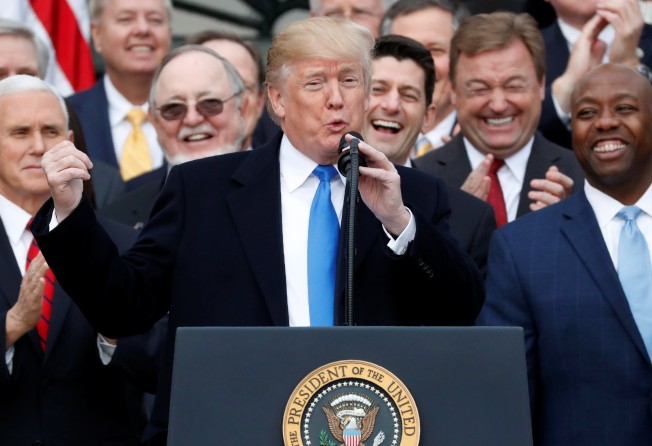America is not China, as Donald Trump and the Republicans may find out in 2018 and 2020
Robert Delaney says bold moves from the US and China, on tax cuts and internet controls, require political support to thrive. But while popular opinion is unlikely to significantly influence Beijing, Trump may well face a reckoning for selling out his base

The Chinese and US governments have each recently made bold moves that align more with the interests of their respective ruling parties than with rank-and-file citizenry.
One of the two has a much better chance of making their plans permanent.
US Republicans in control of Congress just passed a tax overhaul that even The Wall Street Journal – a publication that broadly supports Republicans and tax cuts – criticised, calling the assumptions behind their plan “murky”.
“Independent economists say the tax cuts won’t pay for themselves,” the newspaper reported, adding that the changes would drive deficits “higher by US$1 trillion over a decade even after accounting for stronger growth”.
A Wall Street Journal/NBC News survey released on October 31 showed 25 per cent of Americans rated the tax plan a “good idea”, compared with 35 per cent who called it a bad one.
As The New Yorker put it, “the unfairness and ideological bent of the proposal are widely recognised, as is its corrupt nature” – because of the breaks it offers to the wealthy, large corporations and the kind of commercial real-estate entities that make up a large portion of Donald Trump’s business empire.
Watch: A fact check for the Republican tax plan
Trump won the White House on a pledge to re-enfranchise Americans who had missed out on the economic expansion of recent decades and were hit hardest during the 2008-2012 recession.
His argument was powerful enough for many Americans to ignore the racism and general divisiveness that was core to the Trump campaign, and which has been a hallmark of his administration.
But once the reality of an additional US$1.5 trillion worth of deficits becomes apparent, lawmakers will need to address the problem by cutting government services and benefits, which working-class Americans rely on more than those benefiting from the tax overhaul.
Trump is burning his base of support at a time when his overall approval rating has dropped
By goading congressional Republicans into passing their tax package, Trump is burning his base of support at a time when his overall approval rating has dropped to the mid- to low-30 per cent range, from the mid-40s when he took office. That leaves Trump and the Republicans’ tax initiative vulnerable in 2018.
In the middle of the tax overhaul saga, Republican appointees on the Federal Communications Commission ended net neutrality in the US. The change essentially clears the way for the largest US telecommunications providers – which also own TV studios and websites – to throttle access to online content they deem competitive, and make consumers pay more for services like Netflix. Another win for large corporations.
Meanwhile, the Chinese government is making headway in its efforts to automate surveillance of its citizens, both as a form of public security and to support a “social credit” caste system. A full accounting of these capabilities is beyond the scope of this column. What needs to be understood, though, is that technological glitches, data breaches and mistaken identity are part and parcel of our technologically driven societies.
It can be a headache when online remittances go wrong or when someone unjustifiably gives someone else a bad review on Uber or Airbnb, but they’re not life-changing. Outside China, online platforms are still, in most cases, disparate enough – and rectification channels robust enough – to limit the damage.
Watch: China sets up new rules on internet activity
Not so in China, where a false reading of an individual’s activity – online or off – can relegate that person to a self-magnifying downward spiral into social irrelevance or worse. And shifting standards about what is considered to be punishable behaviour makes what’s happening in China even more fraught for the individual, especially the risk-taking types who tend to drive innovation.
While the tax overhaul and changes to internet policy in the US and expanding surveillance in China are different issues, they are all tied directly to ruling party objectives and require political support – if not acceptance or acquiescence – to remain in place.
Mainland Chinese broadly accept the monitoring of online activity and private data commerce, and, even if that changed, the odds that popular opinion would reverse the government’s course are low.
But in the US, Republicans face midterm elections next year, and their historically unpopular leader will face a reckoning in 2020 for policies that have sold out his base.
Robert Delaney is a US correspondent for the Post based in New York